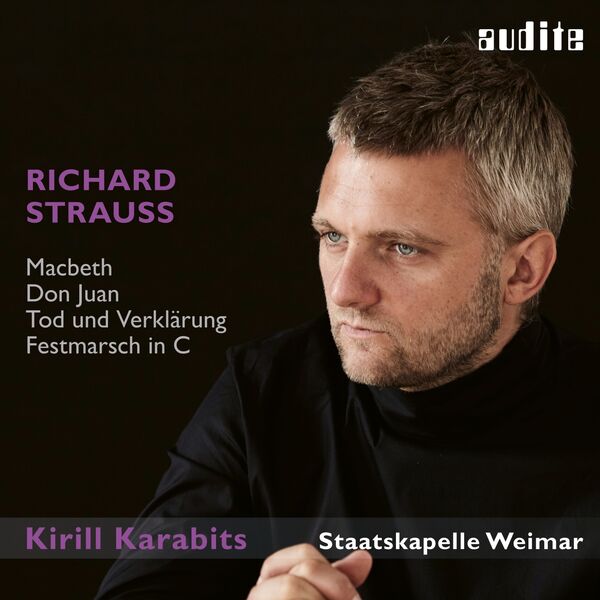
Streaming ilimitado
Escuche este álbum ahora en alta calidad en nuestras apps
Comenzar mi periodo de prueba gratis y escuchar este álbumDisfrute de este álbum en las apps Qobuz con sususcripción
SuscribirDisfrute de este álbum en las apps Qobuz con sususcripción
Idioma disponible: inglés
Following the release of Prokofiev's Cantata for the 20th Anniversary of the October Revolution, Kirill Karabits dedicates his next Audite recording with the Weimar Staatskapelle to the "Weimar" Strauss. Weimar was not only the metropolis of the classical era that acquired world fame thanks to Goethe and Schiller. Weimar was also the domain of great musicians: Franz Liszt served as Kapellmeister in the city and invented the genre of the symphonic poem. Richard Strauss followed in his footsteps when he, as Kapellmeister from 1889 until 1894, presented his own first symphonic poems, Macbeth and Don Juan, at the helm of the Weimar court orchestra. Kirill Karabits, Generalmusikdirektor of the Deutsches Nationaltheater since 2016, now presents, alongside today's Weimar Staatskapelle, not only these two major works of his great predecessor, but also Tod und Verklärung, which Strauss had completed in Weimar. The contemporaneous Festmarsch in C major - Strauss' anniversary gift to "Die Wilde Gung'l", the Munich orchestra he had conducted in his youth - is a true rarity, rounding off this recording. © Audite
Más informaciónEstá escuchando muestras.
Escuche más de 100 millones de pistas con un plan de streaming ilimitado.
Escuche esta playlist y más de 100 millones de pistas con nuestros planes de streaming ilimitado.
Desde $ 16.190,00/mes

Richard Strauss, Composer - Copyright Control, MusicPublisher - Kirill Karabits, Conductor - Staatskapelle Weimar, Ensemble, MainArtist
2018 audite Musikproduktion 2018 audite Musikproduktion
Richard Strauss, Composer - Copyright Control, MusicPublisher - Kirill Karabits, Conductor - Staatskapelle Weimar, Ensemble, MainArtist
2018 audite Musikproduktion 2018 audite Musikproduktion
Richard Strauss, Composer - Copyright Control, MusicPublisher - Kirill Karabits, Conductor - Staatskapelle Weimar, Ensemble, MainArtist
2018 audite Musikproduktion 2018 audite Musikproduktion
Richard Strauss, Composer - Copyright Control, MusicPublisher - Kirill Karabits, Conductor - Staatskapelle Weimar, Ensemble, MainArtist
2018 audite Musikproduktion 2018 audite Musikproduktion
Presentación del Álbum
Following the release of Prokofiev's Cantata for the 20th Anniversary of the October Revolution, Kirill Karabits dedicates his next Audite recording with the Weimar Staatskapelle to the "Weimar" Strauss. Weimar was not only the metropolis of the classical era that acquired world fame thanks to Goethe and Schiller. Weimar was also the domain of great musicians: Franz Liszt served as Kapellmeister in the city and invented the genre of the symphonic poem. Richard Strauss followed in his footsteps when he, as Kapellmeister from 1889 until 1894, presented his own first symphonic poems, Macbeth and Don Juan, at the helm of the Weimar court orchestra. Kirill Karabits, Generalmusikdirektor of the Deutsches Nationaltheater since 2016, now presents, alongside today's Weimar Staatskapelle, not only these two major works of his great predecessor, but also Tod und Verklärung, which Strauss had completed in Weimar. The contemporaneous Festmarsch in C major - Strauss' anniversary gift to "Die Wilde Gung'l", the Munich orchestra he had conducted in his youth - is a true rarity, rounding off this recording. © Audite
Acerca del álbum
- 1 disco(s) - 4 pista(s)
- Duración total: 01:10:32
- 1 Libreto digital
- Artistas principales: Weimar Staatskapelle Kirill Karabits
- Compositor: Richard Strauss
- Sello: audite Musikproduktion
- Género Clásica Música sinfónica
2018 audite Musikproduktion 2018 audite Musikproduktion
Mejorar la información del álbum
